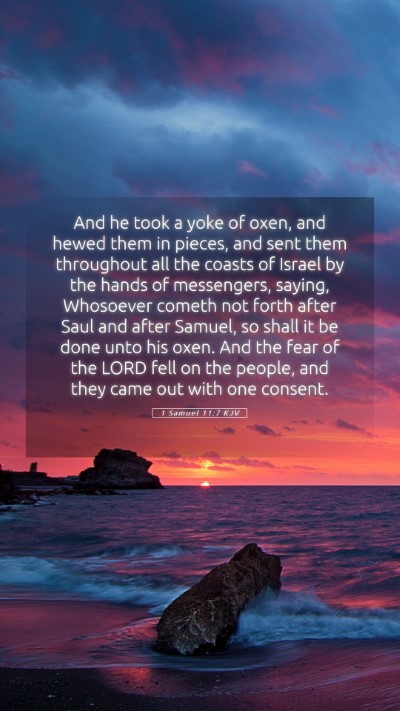Understanding 1 Samuel 11:7
This passage from 1 Samuel 11:7 offers rich insights into the nature of leadership, divine guidance, and the significance of communal actions in response to adversity. Below, we delve into the combined interpretations from various public domain commentaries, elucidating the profound meanings contained within this scripture.
Verse Context
1 Samuel 11:7 reads:
"And he took a yoke of oxen, and hewed them in pieces, and sent them throughout all the coasts of Israel by the hands of messengers, saying, Whosoever cometh not forth after Saul and after Samuel, so shall it be done unto his oxen. And the fear of the Lord fell on the people, and they came out with one consent." (1 Samuel 11:7, KJV)
Summary of Insights
This verse can be broken down into several key components that illuminate its meaning:
- The Significance of Saul's Leadership: Saul's act of sending out the pieces of the oxen symbolizes a serious call to action. He is rallying the Israelites to unite against their common enemy, showing the importance of decisive leadership in times of crisis. This mirrors the role of a leader who evokes fear and seriousness through a strong and sometimes dramatic gesture.
- The Role of Fear and Awe: The mention of "the fear of the Lord" alludes to a divine influence on the people's hearts. This indicates that their response was not solely motivated by fear of Saul but also by a recognition of God’s sovereignty. The fear mentioned here reflects a profound respect and reverence that leads to collective action.
- Unity Against Adversity: The phrase "they came out with one consent" underlines the idea of unity among the people. During hard times, communal harmony and concerted effort become pivotal for overcoming challenges, suggesting that collective faith and action are essential for success.
- Symbolism of Sacrifice: The act of cutting up the oxen signifies a commitment to the cause. It portrays a powerful image of sacrifice, suggesting that such dedication is necessary for achieving communal goals. Implicitly, it calls individuals to reflect on what they are willing to sacrifice for the greater good.
- Divine Calling and Obedience: In the broader narrative, this call serves as a divine direction for the Israelite tribes. It emphasizes being receptive to God's voice, which often comes through leaders or unique events, urging the people to respond faithfully to their obligations.
Bible Verse Meaning
In terms of bible verse meanings from a practical perspective, 1 Samuel 11:7 serves as a reminder of the dynamics within leadership as they relate to divine authority and communal response. Effective leadership involves invoking a sense of urgency and respect that stirs the community into action, a principle relevant in both biblical times and contemporary society.
Commentary Analysis
Various commentaries provide additional insights into this verse:
- Matthew Henry: Henry emphasizes the importance of Saul's action as a demonstration of his emerging authority and divine anointing. He notes that Saul's decisive actions reflect God's power to unite and mobilize the people, showcasing the synergy between divine will and human initiative in leadership.
- Albert Barnes: Barnes highlights the significance of obedience to divine commands, suggesting that the fear induced among the people led to a unified response against their enemies. He underscores that this illustrates a moral obligation for believers to respond to God's directives with swift action.
- Adam Clarke: Clarke draws attention to the cultural context of the act of dismemberment of the oxen, explaining that this was a customary practice that signified seriousness about one's message. He places emphasis on how Saul effectively communicates the urgency of the situation and unites the tribes of Israel towards a common goal.
Application of This Verse
Applying Bible verses to daily life, 1 Samuel 11:7 encourages individuals to consider the elements of leadership and community in their own contexts. Here are some reflective questions:
- How can we demonstrate unity in our communities during challenging times?
- What sacrifices are we willing to make for the well-being of others?
- In what ways can we respond to God’s calling through leaders in our lives?
- How does our understanding of divine fear influence our actions and decisions?
Cross References
This verse can be related to several other scriptures that enhance understanding:
- 1 Samuel 10:24: Saul's anointing and the people's recognition of him as king.
- Exodus 19:16-20: The fear of the Lord on Mount Sinai, illustrating divine presence and authority.
- Joshua 24:14-15: A call for the Israelites to serve the Lord in unity, reflecting community commitment.
Conclusion
In summary, 1 Samuel 11:7 is a profound verse demonstrating the intertwining of divine authority, leadership, and community action. It challenges readers to analyze their own lives concerning leadership and obedience to God. Through exploration of this verse, believers gain deeper bible verse understanding, enriching their bible study insights and facilitating thoughtful bible verse commentary in personal and group settings.


